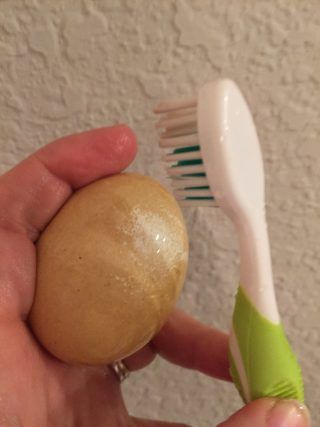What Happens if You Don’t Brush Your Teeth? A Hands-on Science Experiment
We’re back for part 2 of our Kids’ Oral Health series! We have kids, so we know that when you ask your kid to do something, you are likely to hear back, “Why?” Even if they don’t mean to be defiant or sassy, kids are naturally curious and have so much to learn about the world. They can’t help but wonder the reason behind the instructions. So, today we have a great visual that helps kids explore the reason we really need to guard our oral health! Ready to get your hands dirty?
Why Should We Brush Our Teeth?
When we don’t brush our teeth two things happen: First, we leave behind food and sugars on our teeth. This feeds the bacteria on our teeth and then they produce acid which wears away our enamel. Secondly, we don’t strengthen our enamel with fluoride to help rebuild our tooth’s protection from everyday wear from eating. Let’s look at how we can see this demonstrated.
For this experiment, we are going to explore what happens when we let sugary drinks and food particles sit on our teeth. Our own teeth are far too valuable explore this, so we are going to use hard-boiled eggs in their place. Eggs are similar to our teeth in a few ways: They have a hard outside, and are softer yet firm inside. Also, their shell is made of similar matter as our tooth enamel. To imitate drinking dark, sugary drinks we are going to use soda, and to imitate food we will use vinegar. Vinegar is an acid which is what the bacteria in our mouth make when they eat our leftover food bits.
Safety First
Whenever you’re doing science experiments with young kids especially, remind them that even if you’re using supplies that they have eaten before (eggs, soda, etc) they should never eat or taste something used in a science experiment. Even though nothing in this experiment is likely to hurt kids, it’s a great rule to establish good habits for future experiments. If you have safety glasses and a lab coat or paint smock you can also encourage your kids to wear them. Again, it’s not necessary for this experiment but is a good habit.
Supplies
- 6 Hard-boiled eggs, cooled and with no cracks
- 6 clear plastic or glass cups, preferably just slightly bigger than the eggs
- 1 paper plate (optional)
- 2.5 cups of fluoride rinse, or a tube of fluoride toothpaste
- 2 cups of dark soda
- 2 cups of white vinegar
- 2 cups of water
Make a Hypothesis
Ask your kids to make a guess (hypothesis) as to what will happen when they let their eggs sit in the different liquids and write them down.
Procedure
- Observe the eggs- What do they feel like? What do they look like? Do they have a smell?
- Write down all your observations about the eggs on a sheet of paper.
- Place 3 of the eggs in cups and cover with fluoride, or use your fingers to completely cover 3 of the eggs with fluoride toothpaste and set gently on a paper plate.

- Wait 24-48 hours. Then rinse the toothpaste off the eggs or dump the fluoride solution.
- Place each of the 6 eggs in cups and make a label for each cup: Fluoride, Water; No Fluoride, Water; Fluoride, Soda; No Fluoride, Soda; Fluoride, Vinegar; No Fluoride, Vinegar; No Fluoride, Vinegar
- Fill each cup as labeled, covering the eggs as much as possible (sometimes the eggs will float)

- Make observations and write them down: What do you notice right away about the liquids? Smells?
- Wait another 24-48 hours.

- Take each egg out to observe it. What has changed? What does it look like? Smell like? Feel like?
Every experiment might turn out a little differently. Factors such as the age of your eggs, whether they were cracked, or how long you let them soak will affect your results. Generally speaking, you should notice that the eggs soaked in water look the same or “normal” with strong shells. Eggs soaked in soda will develop a dark brown stain on them, and may thin or become brittle. You may find you are able to clean these stains off with a gentle brushing with a spare toothbrush, especially the egg which was first strengthened in fluoride. The eggs which sat in vinegar should become very soft and rubbery with a leathery exterior. The acids in the vinegar have eaten away most of the shell.




Application
Talk with your kids about what they learned from this experiment. If these foods had this effect on the eggs, what might they do to their teeth? Ask if they think it’s important to brush their teeth, and why or why not? Talk about whether you noticed the fluoride making a difference. Did your kids’ hypothesis prove true?
We hope this hands-on visual helps your kids understand why it is so important to brush twice a day for 2 full minutes! It’s been a week since our last blog- how have your kids done on owning their oral health this past week? Feel free to comment below to let us know how it’s going, or for specific questions.
The post What Happens if You Don’t Brush Your Teeth? A Hands-on Science Experiment appeared first on West One Family Dental.





